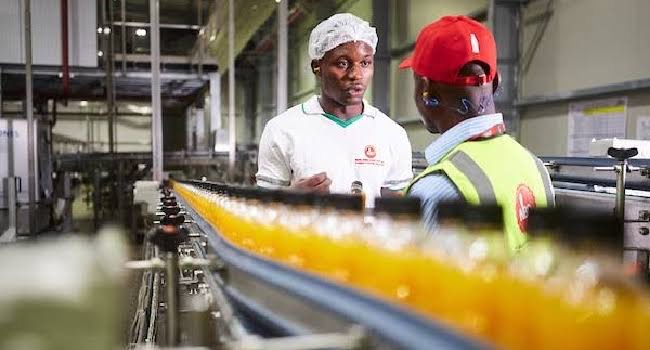The aggressive interest rate hikes implemented by the Monetary Policy Committee (MPC) of the Central Bank of Nigeria (CBN) have caused significant repercussions for manufacturers in the country, forcing them to repay a staggering N1.595 trillion owed to Deposit Money Banks (DMBs) and other creditors during the first half of 2024.
This represents a monumental 143.76 percent increase from the N654.27 billion spent by 11 major manufacturing companies in the first six months of 2023, according to an analysis of their financial statements through June 2024, as reported by journalists.
This sharp rise in loan repayments, covering both interest payments and loan principals, is indicative of the high-interest rate environment that has characterized Nigeria’s financial landscape.

The country’s benchmark interest rate now stands at an elevated 27.25 percent, creating a challenging scenario for borrowers, particularly manufacturers, who are now forced to allocate more resources toward debt servicing.
On Tuesday, the CBN’s MPC met for the fifth time in 2024 and voted to raise the monetary policy rate (MPR), Nigeria’s benchmark interest rate, to 27.25 percent. This unexpected move shocked the financial markets, marking an increase of 50 basis points from the previous rate of 26.75 percent set in July 2024.
Under the current leadership of CBN Governor Olayemi Cardoso, interest rates have risen by 850 basis points, or 8.5 percent, continuing the hawkish monetary policy initiated in May 2022, aimed at combating persistent inflation.
Governor Cardoso has remained firm in his stance that the CBN will persist in tightening monetary policies to address the country’s high inflation rate. However, this relentless policy shift has had wide-reaching consequences.
The continuous rate hikes have driven up banks’ lending rates, compelling borrowers, especially in the manufacturing sector, to repay more in interest. This, in turn, has exacerbated the financial strain on businesses.
Financial analysts have highlighted that these sustained interest rate increases are placing an unsustainable financing cost burden on manufacturers. The money being channeled toward repaying loans could otherwise be invested in expanding operations, generating more employment, and fostering broader economic growth.
Instead, companies are struggling under the weight of rising debt servicing costs, diminishing their ability to reinvest in their businesses.
The Organised Private Sector (OPS) has also raised alarms about the potential ripple effects of the MPC’s interest rate hikes. There are growing concerns that the continued elevation of interest rates may worsen the issue of non-performing loans (NPLs) in DMBs.

As borrowing becomes increasingly expensive, more businesses may struggle to meet their debt obligations, leading to a surge in bad loans across the banking sector.
While manufacturers grapple with the financial impact of these rate hikes, the banking sector has reaped considerable benefits. The combined net interest income of eight major Nigerian DMBs surged by a whopping 163.19 percent in the first half of 2024, reaching N4.79 trillion, up from N1.82 trillion during the same period in 2023.
This growth was driven by an expanded loan portfolio and higher returns on interest-bearing assets, as banks capitalized on favorable economic conditions.
The financial sector’s profitability can be attributed to the ability of banks to charge higher rates on variable-rate loans and increase yields on new fixed-rate loans, bolstering their interest income.
However, when interest rates eventually fall, banks could face reduced profitability as their interest income shrinks.
On the other hand, many manufacturers are now counting their losses. The combination of higher borrowing costs and low consumer purchasing power is putting pressure on their sales and profitability.
An investigation by Journalists revealed that between January and June 2024, 11 major manufacturers collectively spent N1.595 trillion on repaying loans and interest.
This marks a 143.76 percent or N940.62 billion increase from the previous year. The surge in interest rates has prompted manufacturers to accelerate their debt repayments to mitigate future cost increases.
According to the analysis, Dangote Cement led the list of companies with the highest loan and interest repayments in the first half of 2024, spending a massive N708.26 billion.
Of this amount, N90.31 billion went toward interest payments, while N618 billion was used to repay the principal on its loans. This figure reflects a 398 percent increase from the N142.21 billion the company paid in the corresponding period in 2023.
BUA Foods followed closely, with total loan and interest repayments of N319.18 billion, a staggering 1,015.62 percent increase from the N28.61 billion spent in 2023. Nigerian Breweries ranked third, spending N173.43 billion on loan repayments, though this was a slight decrease from the N189.72 billion spent in 2023.
BUA Cement also saw a reduction in its loan repayments, spending N117.25 billion in the first half of 2024, a 16.69 percent drop from the N140.75 billion it repaid in 2023. Notore Chemical Industries recorded N104.4 billion in loan and interest repayments, up significantly from N33.1 billion the previous year.
Other companies, including Nestlé Nigeria, Honeywell, and Flour Mills of Nigeria, also faced substantial loan repayment burdens. Nestlé spent N98.65 billion on debt servicing, while Honeywell paid N2.77 billion, and Flour Mills of Nigeria spent N221 million.
E-Tranzact International, Unilever, and Dangote Sugar also made notable payments, with figures ranging from N49.89 million to N809.73 million and N177.49 million, respectively.
In its financial report, Unilever Nigeria highlighted the risks posed by the high-interest-rate environment. The company stated, “Overdrafts issued at variable rates expose Unilever to cash flow interest rate risk,” emphasizing the need for careful management of interest rate exposures on its borrowings.
Dangote Sugar also underscored the challenges posed by fluctuating interest rates, stating, “The Group is exposed to fluctuations in interest rates on its borrowings. The company actively monitors interest rate exposures to minimize the effect on the income statement.”
These manufacturers’ struggles with rising interest rates highlight the broader economic challenges facing the Nigerian business landscape. As the CBN continues its monetary tightening policies, businesses must navigate an increasingly complex and expensive borrowing environment while balancing growth ambitions and financial sustainability.
































